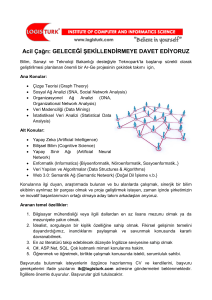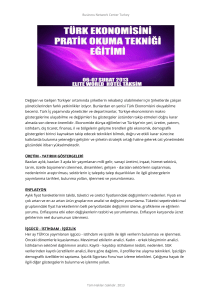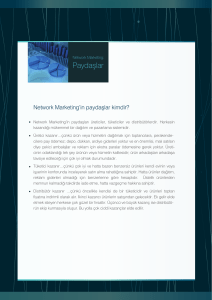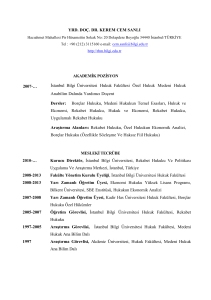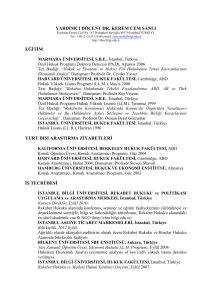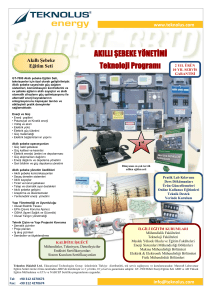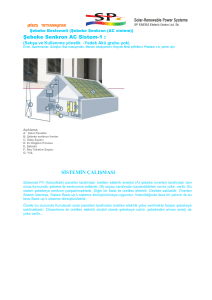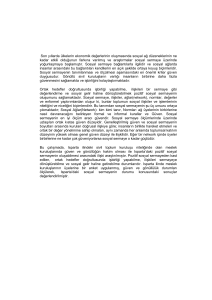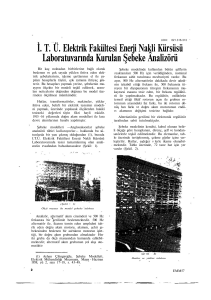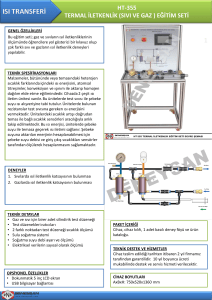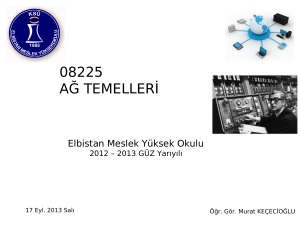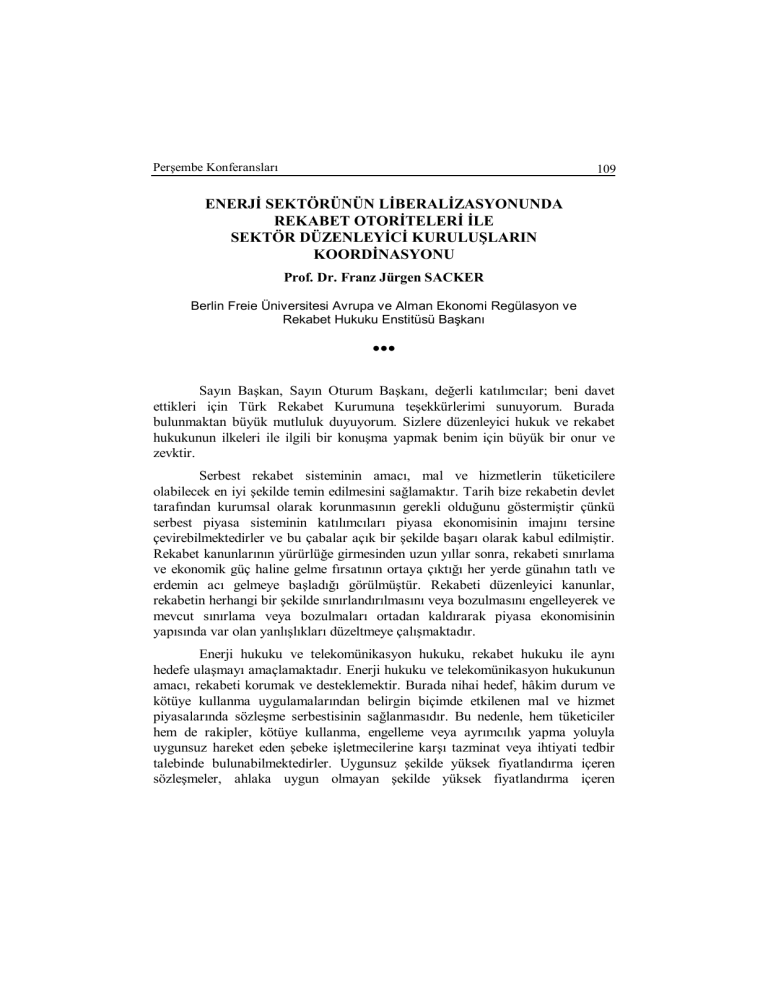
Perşembe Konferansları
109
ENERJİ SEKTÖRÜNÜN LİBERALİZASYONUNDA
REKABET OTORİTELERİ İLE
SEKTÖR DÜZENLEYİCİ KURULUŞLARIN
KOORDİNASYONU
Prof. Dr. Franz Jürgen SACKER
Berlin Freie Üniversitesi Avrupa ve Alman Ekonomi Regülasyon ve
Rekabet Hukuku Enstitüsü Başkanı
●●●
Sayın Başkan, Sayın Oturum Başkanı, değerli katılımcılar; beni davet
ettikleri için Türk Rekabet Kurumuna teşekkürlerimi sunuyorum. Burada
bulunmaktan büyük mutluluk duyuyorum. Sizlere düzenleyici hukuk ve rekabet
hukukunun ilkeleri ile ilgili bir konuşma yapmak benim için büyük bir onur ve
zevktir.
Serbest rekabet sisteminin amacı, mal ve hizmetlerin tüketicilere
olabilecek en iyi şekilde temin edilmesini sağlamaktır. Tarih bize rekabetin devlet
tarafından kurumsal olarak korunmasının gerekli olduğunu göstermiştir çünkü
serbest piyasa sisteminin katılımcıları piyasa ekonomisinin imajını tersine
çevirebilmektedirler ve bu çabalar açık bir şekilde başarı olarak kabul edilmiştir.
Rekabet kanunlarının yürürlüğe girmesinden uzun yıllar sonra, rekabeti sınırlama
ve ekonomik güç haline gelme fırsatının ortaya çıktığı her yerde günahın tatlı ve
erdemin acı gelmeye başladığı görülmüştür. Rekabeti düzenleyici kanunlar,
rekabetin herhangi bir şekilde sınırlandırılmasını veya bozulmasını engelleyerek ve
mevcut sınırlama veya bozulmaları ortadan kaldırarak piyasa ekonomisinin
yapısında var olan yanlışlıkları düzeltmeye çalışmaktadır.
Enerji hukuku ve telekomünikasyon hukuku, rekabet hukuku ile aynı
hedefe ulaşmayı amaçlamaktadır. Enerji hukuku ve telekomünikasyon hukukunun
amacı, rekabeti korumak ve desteklemektir. Burada nihai hedef, hâkim durum ve
kötüye kullanma uygulamalarından belirgin biçimde etkilenen mal ve hizmet
piyasalarında sözleşme serbestisinin sağlanmasıdır. Bu nedenle, hem tüketiciler
hem de rakipler, kötüye kullanma, engelleme veya ayrımcılık yapma yoluyla
uygunsuz hareket eden şebeke işletmecilerine karşı tazminat veya ihtiyati tedbir
talebinde bulunabilmektedirler. Uygunsuz şekilde yüksek fiyatlandırma içeren
sözleşmeler, ahlaka uygun olmayan şekilde yüksek fiyatlandırma içeren
110
Prof. Dr. Franz Jürgen SACKER
sözleşmeler kadar geçersiz kabul edilmektedir. Düzenleyici kurumlar ve antitröst
kurumları hukuki davalarda yer almamaktadır.
Telekomünikasyon ve enerji kanunlarının amacı, tüketicilerin yararına
olacak şekilde etkin, rekabet odaklı ve güvenli enerji ve telekomünikasyon
piyasaları sağlamaktır. Ayrımcı olmayan, rekabetçi ve etkin piyasaları garanti
eden kanunların uygulanması düzenleyici kurumların görevidir. Şebeke
işletmecilerinin sektörde güvenli, güvenilir ve etkin bir şebeke temin etmeleri
gerekmektedir. Etkin ve güvenli şebekelerde gerçek rekabetin sağlaması, şebeke
işletmecisinin şebeke işletmesinden tekel kaynaklı kar elde ederek kendi şebekesi
dışındaki enerji ve telekomünikasyon hizmeti sunan diğer işletmelere üstünlük
sağlamadığı durumlarda mümkün olmaktadır. Şebeke işletmesinden elde edilen
tekel kaynaklı karın hizmet sunucunun yıkıcı fiyatlama stratejisi için kullanılması,
gerçek rekabetin ortaya çıkmasını engellemektedir.
Şebekelerin yasal olarak açılması gerekmektedir çünkü tüketici talebinin
arz edilmesi yalnızca yerel hizmet şebekelerinin doğal tekeli ile mümkün
olmaktadır. Tüm hizmet sunucuların şebekelere erişimi sağlanmalıdır. Doğal
tekel, tek bir şirketin, sırasıyla ölçek ekonomisi veya kapsam ekonomisi nedeniyle,
bir hizmet talebini birden fazla şirketin sağladığından daha düşük bir fiyata
sağladığı durumlarda ortaya çıkmaktadır. Elektrik, doğalgaz, su, kanalizasyon ve
elektronik şebekelerinin yanı sıra raylı sistemler doğal tekel oluşturabilmektedir
çünkü bu şebekeler için birden fazla altyapı sağlanması ekonomik açıdan kabul
edilemez maliyetlere yol açacaktır. Bir doğal tekelin sahibi olan bir şebeke
işletmecisinin sunduğu hizmetler başka işletmeler tarafından sunulamaz ve
dolayısıyla böyle bir işletmeci, başka şebeke işletmecileri ile rekabet eden bir
şebeke işletmecisinden daha fazla sosyal hesap verme yükümlülüğüne sahiptir.
Şebeke altyapısına ilişkin düzenlemelerin amacı, tüketicilerin yararına
olacak şekilde etkin ve rekabet odaklı piyasalar sağlamaktır. Buradaki ilke budur.
Sistem işletmecilerinin kendi sektörlerinde mallar için işleyen bir rekabet ortamına
koşul olarak güvenli ve etkin bir şebeke sağlaması gerekmektedir. Gerçek rekabet
yalnızca, şebeke sahibinin şebeke dışındaki diğer enerji tedarikçilerine üstünlük
sağlayamadığı durumlarda mümkün olmaktadır.
Düzenleyici hukuk tarafından engellememesi halinde, şebeke
işletmesinden elde edilen karlar dikey olarak bütünleşmeyen enerji teşebbüslerine
karşı yıkıcı fiyatlandırma stratejisini finanse etmek amacıyla kullanılabilmektedir.
Bu nedenle, her hizmet tedarikçisinin şebekelere erişiminin sağlanması ve hizmet
tedarikçilerinin hepsinin ayrımcı olmayan eşit koşullara sahip olmaları
gerekmektedir.
Perşembe Konferansları
111
Enerji hukuku, devletin genel ekonomik yarar sağlayan hizmetlerin kamu
yararına sunumuna ilişkin sorumluluklarını yerine getirdiğinden emin olmalıdır.
Bunun yanı sıra, enerji hukuku özel şirketlerin kamuya karşı görevlerini yerine
getirmeleri ve devletin yükünü hafifletmeleri için yeterli teşviki sağlamalıdır.
Bu temelde, şebeke sektörlerine ilişkin düzenlemelerin bir yandan özel
şirketlerin kamuya karşı görevlerini yerine getirmelerini sağlarken bir yandan da
hizmetlerin kamu yararına sunumunu sağlamalıdır. Avrupa’da etkin ve aynı
zamanda güvenli ve güvenilir şebeke altyapılarının garanti edilmesine ilişkin bu
iki kutuplu işlev, “düzenleyici hukuk” terimi veya bazı kişilerin deyimiyle
“özelleştirme sonrası hukuk” terimi ile ifade edilmektedir. Devletin şebeke
altyapısını düzenleme görevi, özel bir şirketteki dönüşüm süreçlerini içeren kısa
süreli bir görev değildir. Bu görev, devletin etkin bir altyapının garantörlüğünü
üstlendiği uzun süreli bir görevdir. Bu gerçekten yola çıkarak, düzenleyici hukuk
ve rekabet hukukunun aynı hedefe ulaşmayı amaçlayan ikiz kardeşler oldukları
söylenebilir. Düzenleyici hukuk ve rekabet hukukunun ulaşmak istediği bu hedef,
şebeke işletmecilerinin kötüye kullanımına karşı korunan adil ve özerk çıkar
dengesinin sağlanmasıdır. Düzenleyici hukuk kötüye kullanımı engelleyici,
koruyucu, ön (ex-ante) düzenleyici önlemler kullanırken, rekabet hukuku kötüye
kullanımı bastıran uygulama sonrası (ex-post) bir yaklaşım kullanmaktadır.
Düzenleyici hukuk, altyapı şebekelerinin kullanımına yönelik rekabetçi bir tasarım
ortaya koymayı amaçlayan özel bir tür rekabet hukuku değildir. Düzenleyici
hukuk, ilkeleri şebekeler yoluyla aktarılan malların mantığı tarafından değil,
şebekelerin mantığı tarafından belirlenen şebeke ekonomisini yasal yönden
tamamlamaktadır.
Devlet, genel yarar sağlayan hizmetlere yönelik karmaşık bir hükümet
politikaları sistemi niteliğindeki ve Almanya’da Erfüllungsverantwortung olarak
isimlendirilen “doğru uygulama sorumluluğundan” gittikçe daha fazla
uzaklaşmaktadır. Bu durum, etkinliğin iyileştirilmesine ilişkin nedenlerken
kaynaklanmaktadır ve etkinliğin iyileştirilmesinin yalnızca özel şirketler yoluyla
sağlanabileceği düşünülmektedir. Devlet, yalnızca genel kamu yararını olumsuz
etkileyecek bir sorunun tehlikeli boyutlara ulaşması durumunda, denetleme ve
destek sağlama sorumluluğunu üstlenmektedir. Bu kavramın uygulanması
sırasında, çağdaş devlet kolaylaştırıcı ve garantör devlet haline gelmektedir. Bu
durum, devletin rolünün değiştirdiğini açık bir şekilde ortaya koymaktadır ve
devletin mimarisindeki değişimi içeren devletin rolüne ilişkin bir değişim yasasını
ortaya koymaktadır. İlgili AB Yönergeleri üzerine temellendirilmiş ulusal
telekomünikasyon ve enerji hukuku, devletin rolündeki değişimi ortaya
koymaktadır. Devletin kamu hizmet taleplerini karşılama sorumluluğunu
112
Prof. Dr. Franz Jürgen SACKER
azaltmasına rağmen, devletin tüm vatandaşların temel kamu hizmetlerine
ulaşmalarını garanti etme sorumluluğu devam etmektedir.
Enerji hukuku devletin sorumluluklarını yerine getirdiğinden emin
olmalıdır. Enerji tedarik sistemlerinin işletmecilerinin erişim ücretlerinin bir teşvik
düzenlemesi tarafından belirlenmesi durumunda, aynı ilke düzenleyici hukuk için
de fiyatların benzer olması hali nde fiyat rekabetinin sağlanması anlamında
geçerlidir. Bu uygulama, hizmetlerin etkin bir şekilde sunulması amacıyla
teşviklerin belirlendiği ikinci bir yöntemdir.
Üçüncü şemada işletmecilerin sistemlerine erişim için belirlenen ücret ve
koşullar yer almaktadır. İkinci maddede belirtildiği üzere, ücretler etkin ve yapısal
olarak karşılaştırılabilir bir sistem işletmecisine uygun işletme yönetim maliyetleri
üzerine temellendirilir. Burada ilke olarak, etkin ve yapısal olarak
karşılaştırılabilir bir işletim sisteminden bahsedilmektedir.
Teşvik düzenlemesi, bir düzenleme dönemi için etkinlik standartları
dikkate alınarak sistem erişim ücretleri veya sistem erişim ücretlerinden elde
edilen toplam gelir için belirlenen üst sınırlar şeklindeki kılavuz ilkeleri
içermektedir.
Etkinlik standartları, bir düzenleme dönemi süresince, ilgili sistem
işletmecisi veya ilgili sistem işletmecileri grubunun olası ve makul önlemleri
kullanarak kılavuz ilkelerin gerekliliklerini yerine getirmesi veya bunların üzerine
çıkmasını sağlayacak şekilde oluşturulmalı ve dağıtılmalıdır. Bu şekilde,
mallardan sorumlu olan şirketlerin etkinliği güçlendirilmektedir.
Gerekliliklere uygunluk yasal açıdan ister ex-ante ister ex-post olarak
izlensin, fiyatların ex-ante ve ex-post kontrollerine ilişkin standartlar
değişmemektedir çünkü rekabet odaklı bir kontrolün söz konusu olduğu
durumlarda her zaman rekabetçi ve benzer fiyatların uygulanması gerekmektedir.
Bununla birlikte, ekonomik açıdan, bazı durumlarda genel ex-ante kontrol rekabet
kurumunun gerçekleştirdiği ex-post kontrolden daha anlamlı ve etkili olmaktadır.
Düzenleyici kurumlar uzun süre için oluşturulan altyapı şebekesinin etkili ve
güvenilir bir şekilde işlemesinin yanı sıra eş zamanlı olarak ayrımcılık
yapılmamasını, doğru rekabeti ve piyasaların etkin bir şekilde işlemesini garanti
etmekten sorumludur. Bu durumun mümkün olmadığı darboğaz zamanlarında,
fiyat artışlarının ex-ante kontrolünün yapılması uygun olmaktadır.
Rekabet hukuku, daha fazla rekabetin etkin bir şekilde desteklenmesini
veya piyasalarda daha fazla etkinlik veya rekabetin sağlanmasını değil, gerçekte
var olan somut bir rekabetin sağlanması hedefini korumaktadır.
Perşembe Konferansları
113
Düzenleyici kurumların görev kapsamı daha geniştir. Bu kurumlar, doğal
tekellerin sahiplerinin şebekelerini ayrımcılık yapmadan erişime açma ve Avrupa
ortak piyasalarında ve iklim değişikliği nedeniyle rekabetin desteklenmesi için
gerekli olması halinde yeni ve akıllı şebekelere yatırım yapma yükümlülüklerini
yerine getirdiklerinden emin olmalıdır.
Şebeke sektörlerinin rekabetçi bir şekilde düzenlenmesi için neye
gereksinim vardır? Burada etkin hizmet sunumunun maliyeti kavramı ortaya
çıkmaktadır. Ücretlerin rekabete atıfta bulunulmaksızın ve bir kıyaslama
yaklaşımı benimsenmeden yalnızca maliyet odaklı bir şekilde kontrol edilmesi, bu
kavram ile uyuşmamaktadır. Mevcut duruma odaklanılması ne etkili bir rekabet
sağlar ne de piyasaların AB kılavuz ilkeleri açısından etkin bir şekilde işlemesini
sağlar. Kötüye kullanımın denetlenmesi bağlamında rekabete atıfta
bulunulmaması ve taban maliyetlerde etkinliği olup olmadığına bakılmaksızın
sektörde süregelen maliyet standartlarının takip edilmesi, doğru ve gerçek
rekabetin sağlanmasına ilişkin AB Yönergelerinin ihlal edilmesi anlamına
gelecektir. Bu nedenle, bu kavramın doğrulanması tarafsız ve piyasa yapısını
dikkate almayan standartların karşılaştırılması yoluyla yapılamamaktadır. Bu
yüzden, şebeke sektörlerine ilişkin düzenlemelerin bir yandan kamuya karşı
görevlerini yerine getiren özel şirketlerin rekabet odaklı hareket etmelerini
sağlarken, bir yandan da hizmetlerin kamu yararına olacak şekilde sunulduğundan
emin olması gerekmektedir.
Enerji hukukunda belirlenen standartlar Avrupa Topluluğu Antlaşmasının
102. Maddesine karşılık gelmektedir. Bunların ortak amacı, kötüye kullanımın ve
ayrımcılığın önlenmesidir. Bu kavram, karşılaştırılabilir piyasa yaklaşımı ile
işlerlik kazanmakta ve maliyet esaslı ama aynı zamanda etkinlik odaklı bir
yaklaşım ile uygulanır hale gelmektedir. Ücretlerin rekabet odaklı bir şekilde
kontrol edilmesinin amacı, güvenli şebekeler için etkin bir şekilde gerçekleşen
maliyetler üzerine temellendirilmiş fiyatlar oluşturmaktır. Maliyetlerin etkin ve
yapısal olarak karşılaştırılabilir bir işletmecinin maliyetlerine denk olması
gerekmektedir.
Almanya’da ex-ante olarak kontrol edilen fiyatların ex-post olarak kontrol
edilen fiyatlardan daha yüksek olduğuna yönelik bir görüş söz konusudur.
Fiyatların ex-post olarak kontrol edildiği yöntemlerde fiyatların daha düşük
olduğuna ilişkin kuramın doğru olmadığına inanıyorum çünkü hem ex-ante hem
de ex-post kontrollerin temeli 102. Maddedir. Ex-ante ve ex-post kontrollerin
temelini hâkim durumun kötüye kullanımı oluşturmaktadır. Bu nedenle,
piyasaların karşılaştırılması yöntemi ve etkinlik odaklı kontrol yaklaşımı, 102.
Maddenin uygulanmasında ve rekabet hukukunun ex-post kontrolü ve düzenleyici
114
Prof. Dr. Franz Jürgen SACKER
hukukun ex-ante kontrolünde kullanılan iki yöntemdir. Bunların ikisi için de
ölçütler aynıdır. Bu yüzden, işletmeler için geçerli olan fiyat aynı olmalıdır.
Rekabet hukuku daha düşük bir fiyattan sorumlu olmamalıdır. Bu kavramsal
çerçevede, rekabetçi fiyat Fransız kamu hizmeti doktrini bağlamındaki adil fiyat
değil, AB’de mevcut bir karşılaştırılabilir piyasanın yardımıyla belirlenen ve etkin
rekabetçiler tarafından uyulan fiyattır.
Rekabet kurumlarının ve sektöre özel düzenleyici kurumların
sorumlulukları yalnızca Avrupa’da ve özellikle Almanya’da değil, aynı zamanda
ABD’de de sorunlu bir konudur. Bu açıdan ABD örneğinden pek çok şey
öğrendik.
Öncelikle ABD’deki yasal durumu açıklamak istiyorum. Federal Enerji
Yasası, Amerikan Antitröst Kanununun enerji ve telekomünikasyon işletmeleri
tarafından uygulanmasını mümkün kılmaktadır. Amerikan Telekomünikasyon
Yasasına göre, “Yasadaki hiçbir açıklama antitröst kanunlarının hiçbirisini
değiştirmez, ihlal etmez veya yerini almaz”. ABD mahkemeleri tarafından
getirilen ve istisnai durumlarda sektöre özel düzenlemenin antitröst kanunun yerini
almasını mümkün kılan “Üstü Kapalı Dokunulmazlık Doktrini”, bu nedenle
elektronik iletişim sektörü için geçerli olmamaktadır. Yalnızca bir siyasi merci
tarafından alınan doğrudan, bağlayıcı ve açık bir şekilde dile getirilmiş bir
düzenleme kararı antitröst kanunun yerini alabilmektedir.
Bununla birlikte, antitröst kanununa ilişkin yasal süreç, düzenleyici
kurum konuyla yakından ilişkili ve yeterli uzmanlık bilgisi ile donatılmış bir
kurumun süreci tamamlamasını sağlayana kadar askıya alınmalıdır. Bu uygulama
“İlk Yargı Yetkisi Doktrini” olarak isimlendirilmektedir. Bununla birlikte,
şirketler açısından, düzenleyici kurumların idari uygulamaları süresince elde
edilen olumlu bulgular, antitröst kurumlarının uygulamaları üzerinde bağlayıcı bir
etkiye sahip değildir çünkü düzenleyici kurumlar için temel oluşturan gerçek ve
yasal bulgular kararın bağlayıcı etkisi üzerinde bir rol oynamamaktadır. Yargı
yetkisi bulunan bir mahkemenin yasal etkisi olan bir kararı üzerine temellendirilen
“Collateral Estoppel Doktroni” böylesi bir durumda geçerli olmamaktadır.
ABD’nin “Kamusal Müdahale Doktrininin” uygulanmadığı durumlarda, bir
düzenleyici kurum kararına yapılan itiraz rekabeti kısıtlayan bir davranışın kabul
edilmesi için gerekçe olmamaktadır. Buna karşın, Verizon Communications ve
Pacific Bell Telephone kararında, Yüksek Mahkeme konuya ilişkin gereklilikleri
Sherman Yasasının 2. Bölümünde ele alınan tekelleşme ile ilgili olarak ve büyük
oranda düzenlenen tekeller alanında belirlemiştir. Yüksek Mahkeme bu kararı
verirken bir tekelin güvenliği için anlaşmanın reddinin şebeke işletmecisinin
sunduğu temel hizmetlere erişim için yeterli bir neden olarak kabul etmemiştir.
Perşembe Konferansları
115
Almanya’daki
durum
nedir?
Alman
düzenleyici
kurumun
(Bundesnetzagentur) sektöre özel sorumluluğu ve Federal Alman Kartel
Ajansının (Bundeskartellamt) sorumluluğu nedir? Almanya’da erişim ücretleri
tüketicilerin enerji için ödedikleri toplam miktarın üçte birinden fazlasını
oluşturmaktadır. Bu durum ex-ante kontrol yapılmasını gerektirmektedir çünkü
dağıtım sistemlerinin sahibi bir doğal tekel sahibidir. Üretim ve ticaret maliyetleri
gibi diğer maliyetler kartel kurumları tarafından ex-post olarak kontrol
edilmektedir. İkinci maddede belirtildiği üzere, 111. Madde gereğince, düzenleyici
kurumlar tarafından onaylanan sistem erişim ücretleri kartel kurumları tarafından
denetlenememektedir.
Rekabetin Kısıtlanmasını Engellemeye Yönelik Alman Yasasının 19. ve
29. Bölümleri gereğince, enerji ücretleri izlenirken, özel uygulama sürecinde
kartel kurumları ve tüketiciler yalnızca 21. ve 21(8). Bölüm gereğince düzenleyici
kurumlar tarafından onaylanan erişim ücretlerini kabul etmektedir. Buna karşın,
kartel kurumları dağıtım sistemlerine erişim ücretlerini izleyebilir. Bu durum
Avrupa Rekabet Hukukuna uygundur. Ulusal hukuk, kartel kurumunun AB
tarafından sağlanan bu yetkisini göz ardı edemez. Enerji dağıtım sistemi
kullanıcıları, enerji dağıtım sağlayıcılarına sistem işletmecisi tarafından verilen
yanlış bilgiler nedeniyle enerji fiyatlarının bir parçası olan sistem erişim
ücretlerinin çok yüksek olduğu ve AB Antlaşmasının 102. Maddesine göre bunun
kötüye kullanım olduğu konusunda şikâyette bulunabilmektedir.
Elektronik iletişim alanındaki durum enerji hukukundaki durumdan
kuramsal olarak farklıdır. Fiyatların ex-ante olarak düzenleyici kurumlar
tarafından onaylanması gerekse de, rekabet hukuku da geçerliliğini korumaktadır.
İletişim Yasasının 2. Paragrafında belirtildiği üzere, “Yasada kesin bir ayarlama
yapılmadığı takdirde, Rekabet Yasasının hükümleri geçerli sayılır. Kartel
kurumlarının görevleri ve sorumlulukları değişmez.”
Avrupa Adalet Divanı, bazı kararlarında telekomünikasyon düzenleme
kurumları tarafından belirlenen fiyatların rekabet hukukunun kontrollerinden
muaf olmadığını belirtmiştir. Avrupa Adalet Divanının Aralık ayı 2010 yılında
aldığı karar bunu destekler niteliktedir. Telekomünikasyon kurumlarının yüksek
fiyatlar için kısmen sorumlu sayılması, AB Antlaşmasının 102. Maddesinin ihlali
ile para cezalarının düşürülmesini kabul edilebilir hale gitmektedir. Kararda
cezalar yüzde 10 oranında düşürülmüştür.
En yüksek Alman mahkemesi bir düzenleyici kurumun bir sabit
şebekeden bir mobil şebekeye yapılan uzun mesafe aramaların aktarılması için
alınan ücreti iki mobil şebeke arasındaki aramalar için alınan ücretten çok daha
yüksek belirlemek zorunda kaldığı bir davada karar vermiştir. Bir kullanıcı, sabit
116
Prof. Dr. Franz Jürgen SACKER
aramaları diğer mobil şebekeye aktarmadan önce mobil aramalara dönüştüren
yeni bir teknik evrensel sistem kullanarak bu uygulamaya tepki göstermiştir.
Mobil şebeke alanında tekel olan mobil şebeke işletmecisi, aramaları şebekeye
daha düşük bir fiyattan aktarmaya itiraz etmiştir. Bunun sonucunda, Alman
Adalet Divanı ilgili düzenleyici hukuk hükümlerinin yanı sıra 102. Madde ve
Rekabetin
Kısıtlanmasını
Engellemeye
Yönelik
Alman
Yasasının
19. Bölümünün geçerli olduğu kararına varmıştır. Bunun yanı sıra, Alman Adalet
Divanı, piyasa gücünün kötüye kullanılıp kullanılmadığının değerlendirilmesinde
düzenleyici kurumun mobil şebekeye erişim için kabul edilebilir bir sabit şebeke
erişim ücreti belirlemiş olduğunun dikkate alınması gerektiğini belirtmiştir. Bu
temelde, yeni bir küresel sistem ile mobil iletişime erişimin kabul edilmemesi,
piyasa gücünün kötüye kullanımı olarak görülemez. Böylece Alman Adalet Divanı
fiyatları kendisi incelememiştir.
Başka bir davada, Federal Adalet Divanı rekabet hukukunun yalnızca
girişimcilik ile ilgili kararları kartel kurumlarının düzenlemesine tabi tuttuğu
kararını almıştır. Bu nedenle, AB Antlaşmasının 102. Maddesi devlet tarafından
alınan idari kararlar için geçerli değildir. Devlet tarafından alınan kararın
teşebbüs tarafından verilen yanlış bilgiler üzerine temellenmesi durumunda, bu
şekilde yanlış bilgi sağlanması uygunsuz davranış olarak kabul edilmektedir. Bu
durum, 102. Maddenin ihlalidir ve Alman Yasası bunun için tazminat
yükümlülüğü getirmektedir.
Bu örnekler rekabet hukukunun tüketicileri ve rakipleri uygunsuz sistem
erişim ücretlerine karşı kapsamlı bir şekilde korumadığını göstermektedir. Burada
amaç uygulamada olası çift düzenlemekten kaçınmaktır. Rekabet hukuku ve
rekabet kurumları yalnızca arka sırada gözetleyici kurum rolünü üstlenmektedir.
Bunlar, düzenleyici kurumlar etkin bir şekilde çalışmadığı ve bu kurumların
çalışmalarının işlevlerini yerine getirmeye yetmediği durumlarda devreye
girmektedir.
Konuşmamı burada tamamlamak istiyorum. Böylece bu temel bileşenleri
tartışabiliriz ve daha sonra sizlere kartel kurumunun soruşturmasına konu olan
işletmenin fiyatı ile karşılaştırılabilir fiyat ile ilgili yöntemler hakkında bilgi
verebilirim çünkü soruşturma sürecindeki işletmenin fiyatı ile yapısal olarak
karşılaştırılabilir fiyatın belirlenmesinde çok fazla sorun yaşanmaktadır.
Perşembe Konferansları
117
COORDİNATİON BETWEEN COMPETİTİON AUTHORİTİES
AND SECTOR REGULATORS İN THE LİBERALİZATİON OF
ENERGY SECTOR
Prof. Dr. Franz Jürgen SACKER
Berlin Freie University and Head of the Institute for German and European
Economy, Regulation and Competition Law
●●●
Dear President, Dear Chairman, dear participants of this lecture; many
thanks for the invitation to your office. I am very happy to be here. It is a big
honor and pleasure for me to give you a lecture about some principles of
regulatory law and of competition law.
The system of free competition aims to achieve the best possible supply
of goods and services to consumers. Historically we know that the state-sponsored
institutional protection of competition has proved to be necessary because the
participants of a free market system turn the image of the market economy upside
down and the effort is called unmistakable success. Many years after the
competition laws came into force, it was noted that wherever there is an
opportunity given to restrict competition and to implement economic position of
power, sin turns out to be sweet and virtue bitter. Competition regulatory law tries
to correct the faults inherent in the construction of the market economy by
preventing and removing any limitations or distortions of competition.
Energy law and telecommunications law have the same goal as the
competition law. They wish to protect and promote competition. The ultimate
goal is to ensure that freedom of contract exists in markets for goods and services
that are typically affected by domination and exploitation. For this reason, both
consumers and competitors can claim for damages and injunctive relief from
network operators who act improperly in forms of exploitation, obstruction and
distortion and discrimination. And agreements containing improperly excessive
charges is as invalid as any other agreement containing immorally excessive
charges. Regulatory or antitrust authorities are not involved in civil actions.
Telecommunication and energy law aims at efficiency, establishing
competitively oriented and safe energy and telecommunication markets in the
118
Prof. Dr. Franz Jürgen SACKER
interest of consumers. It is a regulatory task to implement laws securing nondiscrimination, effective competition and efficient markets. Network operators
have to maintain the secure, reliable and efficient network in the sector. Real
competition -in efficient and secure networks- only exists if the network operator
cannot achieve an advantage over other energy or telecommunication service
providers without an own network, by drawing on monopoly-based profits from
the network operations. True competition does not exist, for example, if
monopoly-based network operation profits can be used to finance the service
providers predatory pricing strategy.
Opening of networks in a legal sense was necessary because the supply to
consumer is only possible via the natural of monopoly of local service networks.
Every service provider must receive access to the networks. A natural monopoly
exists when a single company -for reasons of economies of scale or economies of
scope respectively- can satisfy the demands for service at a lower price than
multiple companies could. Public electricity, gas, water, sewage, and electronic
networks as well as a railway system constitute national monopolies since
duplication of network infrastructure would cause economically unjustified costs.
The owner of a natural monopoly in form of a network cannot be duplicated and
therefore bears greater obligations and social accountability than the owner of a
network in competition with other networks.
The network infrastructure regulation aims to efficiently establish
competitively orientated markets in the interest of consumers. This is the
principle. System operators have to maintain a secure and efficient network in
their sector as a condition for workable competition of the goods which are
depended upon. Real competition only exists if the network owner cannot achieve
an advantage over other energy service providers without a network.
Network operation profits can be used to finance a predatory pricing
strategy against other non-vertically integrated energy undertakings if regulatory
law doesn’t inhibit it. Every service provider must therefore receive access to the
networks through the same nondiscriminatory conditions.
Energy laws must ensure that the state meets its responsibilities for the
public benefit of the services of general economic interest. At the same time, the
energy laws must create a sufficient incentive for private companies to fulfill
public duties and to relieve the state of the burden.
Therefore the regulation of the network industries has to ensure the
competitive orientation of private individuals fulfilling public duties on the one
hand; on the other hand it has to ensure the public benefit of services. This bipolar
function of guaranteeing efficient as well as reliable and secure networks
Perşembe Konferansları
119
infrastructure in Europe is expressed by the term “regulatory law” or as some
people say “post-privatization law”. The governmental task of regulating the
network infrastructure is not a transitory, short-term task accompanying the
processes of transformation in private company. It is a long-term task of the state
to be a guarantor of efficient infrastructure. In the light of this fact, regulatory
law and competition law appear as twin sisters pursuing the same goal to achieve
a fair, autonomous balance of interests protected against misuse of network
operators. Whereas regulatory law applies an abuse-preventing, prophylactic ex
ante regulation method, competition law employs an expost abuse-repressive
approach. Regulatory law is not a specialized type of competition law on the way
to competitive design for the use of infrastructural networks. It is the judicial
complementation of the network economy the principles of which are defined by
the logic of the network principles, not by the logic of the goods that are
transported by the network.
The state is withdrawing more and more from the responsibility of true,
real implementation, Erfüllungsverantwortung as we say in German, which is
characterized by a complex system of governmental policies for services on behalf
of general good. This is due to reasons pertaining to the importance of efficiency
which can only be expected of private individuals. The state is increasingly only
accepting the responsibility of supervision and support which becomes relevant if
an issue that is detrimental to the general good becomes threatening in the precise
implementation of this concept. So modern state becomes an enabling and
guarantor state. This concept obviously expresses the state’s transition to a new
role and a code for a change in the state’s role which involves a changed
architecture of statehood. National telecommunication and energy laws based on
the respective European directives are an expression of the state’s reduced law.
Although the state reduces its responsibility to fulfill public service demands
itself, it continues to guarantee that all citizens receive essential public services.
The energy laws must make sure that the state meets its responsibilities.
The same principle is true for the regulatory law to ensure price competition for
analogous prices, if the access fees of the operators of energy supply systems may
too be determined by incentive regulations. This is a second method that sets
incentives for the efficient provision of services.
You will see on the chart three, the condition and fees for the access to the
systems of operators. Point two, the fees shall be based upon the costs of
operations management that must comport with an efficient, structurally
comparable system operator. This is the principle here: efficient and structurally
comparable operating system.
120
Prof. Dr. Franz Jürgen SACKER
Incentive regulation involves guidelines as to upper limits that are usually
set before the amount of system access fees or total revenues from system access
fees for a regulation period, taking into account efficiency standards.
The efficiency standards must be formulated and distributed across a
regulation period in such a way that the system operator concerned or the group
of system operators concerned can achieve or exceed the guidelines using its on
the possible and reasonable measures . It is an instrument to strengthen the
efficiency of the companies which are responsible for the goods.
There is a legal requirement, monitored ex ante or ex post from a legal
point of view, the standards for exante or expost control of prices cannot be
different because in competition oriented control it is always about ascertainment
and implementation of standards of competitively analogous prices. However,
from a practical, economic point of view, general ex ante control is more
significant and more effective than ex post, softer control of competition office in
individual cases. So regulatory authorities have the task of guaranteeing
nondiscrimination, true competition, and efficient functioning of markets. There is
a simultaneous assurance of an effective and reliable operation of the
infrastructure networks created for the long-term. If this is not the case, as during
bottleneck situations, an ex ante control of prices is appropriate.
The object protected by competition law is tangible competition existing
in reality and not active promotion of more competition and responsibility for
more efficiency and more competition in the market.
The scope of the regulatory authorities task is more. They permanently
have to secure that owners of natural monopolies fulfill their obligations to open
their networks without any discrimination and to invest in new and smart
networks if it is necessary for promotion of competition, the single European
markets and for climate change.
What is needed for the competitive regulation of networked industries?
That is a workable concept of the cost of efficient service provision. A purely
cost-oriented control of these without reference to competition and without a
benchmark approach is incompatible with this concept. An orientation towards a
respective status quo would ensure neither effective competition nor efficient
functioning of the markets in terms of the EU guidelines. Eliminating the reference
to competition in connection with the supervision of abuse and following the cost
standards customary in the industry regardless of whether or not there are no
efficiency in the base costs would be a violation of the EU Directives to establish
true and real competition. Therefore, a substantiation of the concept cannot be
attained by a comparison with impartial, market-structure-blind standards.
Perşembe Konferansları
121
Therefore, the regulation of networked industries has to ensure the competitive
orientation of private individuals fulfilling public duties on the one hand; on the
other hand it has to ensure the public benefit of services.
The standards set in the Energy Law correspond to Article 102 of the
Treaty of European Community. The common objective is the prevention of
abusive practices, exploitation and discrimination. This concept is operational
with the help of the comparable market standard as well as feasible with the help
of a cost-based efficiency controlling approach. The purpose of the competitive
control of fees is to establish prices that are based upon efficient and good costs
for secure networks. Costs must correspond to those of an efficient and
structurally comparable operator.
In Germany they say that the ex ante controlled price is harder and lower
than an ex-post controlled price. The Cartel Office says these are the same
methods. I think that the theory that the method of controlling the price in an expost proceeding, that these proceedings are softer than an ex-post proceeding is
not correct in theoretical words, because Article 102 has the same basis for two
proceedings. The misuse of dominant position is the basis for an ex-post and exante control. Therefore the method of comparison of markets and the efficiency
controlling approach are two methods in application of Article 102. In the ex-post
control of the competition law and in the ex-ante control of the regulatory law we
find the same criteria. Therefore price which is valid for the enterprises must be
the same. The competition law should not be held responsible for a soft price. In
this conceptual design the competitive price is not a "fair price" in the French
service public doctrine, but rather a price that is to be determined with the help of
an existing comparable market in the EU, which can be acted upon by efficient
competitors.
The responsibilities of the competition agencies and the sector-specific
regulation authorities are not only problematic in Europe, especially in Germany,
but also in the USA. We have learned a lot from the USA in this respect. In the
following, I will therefore first describe the legal situation in the USA.
The Federal Power Act explicitly allows application of US antitrust law
by Energy and Telecommunication Utilities. The American Telecommu nications
Act declares that "Nothing in this Act shall be construed to modify, impair or
supersede the applicability of any of the antitrust laws." So the doctrine of
"Implied Immunity," which was developed by US Courts and under which, in
exceptional cases, a sector-specific regulation replaces the application of the
antitrust law, cannot therefore be carried over to the electronic communications
122
Prof. Dr. Franz Jürgen SACKER
sector. Only a direct, binding and clearly articulated regulation decision, made by
a political authority ousts the antitrust law.
However, the antitrust court proceedings have to be suspended until the
regulatory authority has the agency closest to the matter and equipped with
specialized expert knowledge complete its proceedings: the so-called "Primary
Jurisdiction Doctrine". For the corporations, however, favorable findings during
the regulatory authority's administrative proceedings do not have any binding
effect for the antitrust authority's proceedings. Because the actual legal findings
used as the basis by the regulatory authorities do not play a role in the binding
effect of the decision. The additional "Collateral Estoppel Doctrine" which
attributes the decisions of a court of competent jurisdiction with material legal
effect is therefore not applicable in this case. When the "US State Action
Doctrine" is not applicable, the appeal to a decision made by a regulatory
authority is not a reason for justifying anticompetitive behavior. But in its
judgment "Verizon Communication and Pacific-Bell Telephone," the Supreme
Court set the requisites for the matters of fact in relation to monopolization in
Section 2 of the Sherman Act and also in the area of regulated monopolies at a
very high level. And it did not consider out of hand a refusal to deal for the safety
of a monopole as sufficient reason for access to essential facilities of the network
operator.
What is the situation in Germany? The sector-specific responsibility of
the German regulatory authority Bundesnetzagentur and the responsibility of the
Federal German cartel agency, Bundeskartellamt? Access fees make up one third
and more of the total amount the consumers pay in Germany for energy. This
requires ex-ante monitoring because the owner of the distribution systems has a
natural monopoly. The other costs, production and trading costs that determine
the amount, are monitored ex-post by the cartel authorities. The cartel authorities
cannot audit system access fees approved by the regulatory authorities – Article
111, if you read the point 2.
When monitoring energy prices under Section 19 and 29 of the German
Act against Restriction of Competition, cartel authorities and consumers in
private enforcement proceedings must accept must accept the access fees only
approved under Section 21 and 21(8) of the Energy Act by the regulatory
authorities. The cartel authorities can, however, monitor distribution system
access fees in conformity with European competition law. National law cannot
eliminate this EU-based competence of the cartel agency. Users of energy
distribution systems can therefore address energy suppliers with the objection that
system access fees as a component of the all-inclusive energy price are too high,
Perşembe Konferansları
123
for example because of wrong information given by the system operator and
therefore abusive under Article 102 of the EU Treaty.
This situation in the area of electronic communication is theoretically
different from the situation in energy law. Also prices must be approved ex-ante
by regulatory authorities. The competition law remains applicable. You'll see it in
paragraph 2 of Communications Act, "Unless this Act expressively makes definite
arrangements, the provisions of the Competition Act remain applicable. The
duties and responsibilities of the cartel authorities remain unaffected."
In numerous rulings the European Court of Justice has established that
prices determined by telecommunication regulation authorities are not exempt
from control under competition law per se. The Court confirms its position in a
ruling of December 2010. The telecommunication authorities' partial
responsibility for prices set too high, however, justify reducing fines, in part by a
bridge of Article 102 of the EC Treaty. In the ruling the fines were lowered by 10
per cent.
The highest German court had to rule in a case in which the regulatory
authority had set a significantly higher price for transfers of long distance calls
from a fixed to a mobile network and for the connection of two mobile networks.
The user reacted by converting landline calls to mobile calls using a new technical
global system for mobile communications before transferring the calls to another
mobile network. The operator of the mobile network, who has a monopoly in
relation to this mobile network refused to add protocols into the network at a
lower price. So German Court of Justice ruled that Article 102 and Section 19 of
the German Act against Restraints on Competition are generally applicable
alongside the relevant regulatory law provisions. The Court also ruled, however,
that in this specific case, the assessment of whether market power had been
abused must take into account the fact that the regulation authority had already
granted a fixed network access to the mobile network. Any justifiable conditions
denying further access, as a new global system for mobile communications, could
therefore not be constructed as an abuse of market power. So the Court did not
view the prices themselves.
In a different case, The Federal Court of Justice ruled that competition
law only subjects entrepreneurial decisions to regulation by the cartel authorities
"The State Action Doctrine". Article 102 of the European Treaty can therefore
not be applied to administrative decisions made by the state. If the decision made
by the state is based on false information given by the undertaking, the supply of
false information must be deemed a tortuous act. It's a breach of Article 102 and
the German Tort law establishes damages liability.
124
Prof. Dr. Franz Jürgen SACKER
These examples show that competition law does not comprehensively
protect competitors and consumers against improper system access fees. The
intention is to avoid possible double regulation in practice the competition law and
the competition authorities only play the role of watchdog on the backseat. They
have to work when the regulation authorities don't work efficiently or when they
don't work enough to fulfill their functions.
I think I should, first of all, end my lecture. Because we can discuss about
this principle components and then I can give you some information about the
methods for the comparable price of the same structure as enterprise which is the
object of the investigation of the cartel authority. Because we have a lot of
detailed problems to define the price which is structurally comparable with the
price of the enterprise in the investigation proceedings.

